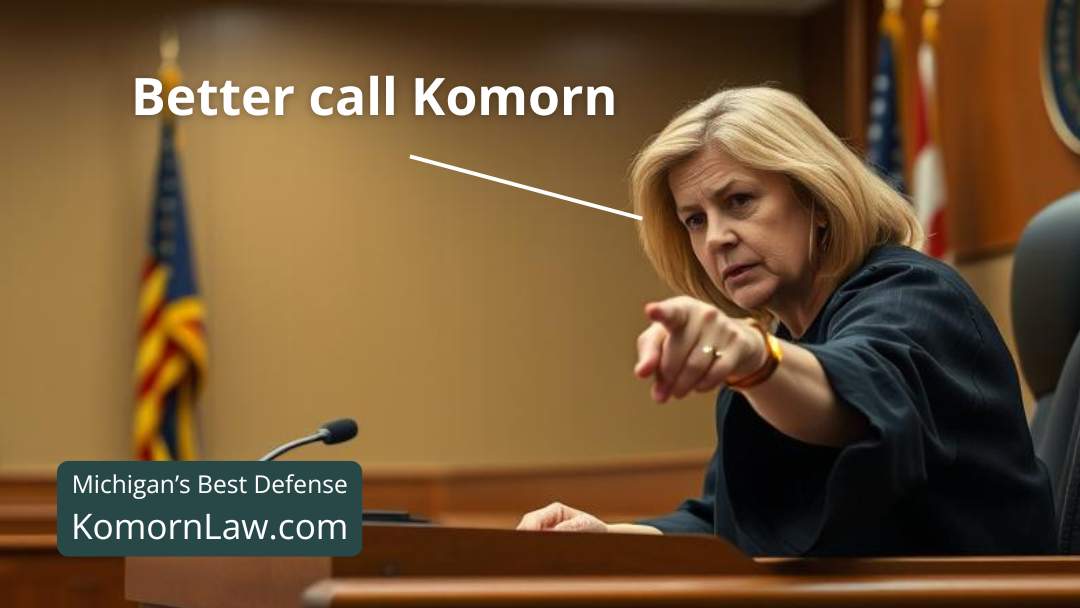No Second Amendment Rights For You
If you are charged with a crime you’re part of the State of Michigan family now. Call us – Because you don’t want to be a part of that family.
Komorn Law (248) 357-2550
A federal judge in Michigan has ruled that a man with a prior misdemeanor conviction for domestic violence remains prohibited from possessing firearms under federal law, even though a Michigan state court had previously set aside that conviction.
Jeramy Wilburn, the plaintiff in the case, began acquiring firearms after his domestic violence conviction was set aside by the state court, believing he was once again eligible to do so. However, the Bureau of Alcohol, Tobacco, Firearms and Explosives (ATF) confiscated his weapons, asserting that he was still federally prohibited from owning them.
Wilburn subsequently sued the ATF and its Director, alleging violations of his Second Amendment rights and seeking a preliminary injunction to have his firearms returned.
U.S. District Judge Susan K. DeClercq sided with the government, granting their motion to dismiss Wilburn’s lawsuit and denying his request for a preliminary injunction. Judge DeClercq explained that under federal law, specifically 18 U.S.C. §921(a)(33)(B)(ii), a prior domestic violence conviction only ceases to be a bar to firearm ownership if the state procedure used to set aside the conviction “completely remove[s] all effects of the conviction.”
Citing the Tenth Circuit Court of Appeals’ decision in Wyoming ex rel. Crank v. United States, Judge DeClercq noted that the terms “expunged” and “set aside” in federal law are intended to be equivalent and require the complete removal of all consequences of the conviction.
The court found that Michigan’s law regarding setting aside convictions does not meet this federal standard. Judge DeClercq pointed out that Michigan law explicitly states that a conviction may still have various legal ramifications even after it has been set aside.
Therefore, Judge DeClercq concluded that “as a matter of statutory construction, the relief Wilburn received under Michigan’s set-aside procedure did not expunge or set aside his conviction for purposes of federal law.”
The 21-page ruling is titled Wilburn, et al. v. Bureau of Alcohol, Tobacco, Firearms and Explosives, et al.; MiLW No. 02-109059.
Link to the full text of the opinion
Recent

Legal Tip – Your Rights During a DUI Stop in Michigan
Komorn Law - Quick Legal TipsLegal Tip: Understanding Your Rights During a DUI Stop in Michigan A DUI stop can be stressful, but knowing your rights is crucial. You have the right to remain silent. You are not obligated to answer questions beyond basic identification....

How to create and share a Dropbox link
Simplified Sender and Receiver Dropbox Share Instructions to Someone NOT on your Team. Don't get caught up in another license or give access to your whole box by mistake.Dropbox Sender Share Instructions Log into your Dropbox account Hover over the file or folder...
More
Felony Firearm Possession in Michigan
Felony Firearm Possession in Michigan.In Michigan, the laws surrounding firearms are strict, especially when it comes to felony firearm possession. If you’re charged with a felony and found to be in possession of a firearm during the crime, the penalties can be...
Do the passengers in your vehicle have 4th Amendment Rights?
Do Passengers in your vehicle have 4th Amendment Rights against Search and Seizure?Passengers in a vehicle are afforded Fourth Amendment protections against unreasonable searches and seizures, though the scope of these rights varies based on the specific circumstances...
Probable Cause v Reasonable Suspicion
What's the difference between probable cause and reasonable suspicion?Definition of Probable Cause Probable cause refers to the belief held by a reasonable person that a crime is currently being committed, has already been committed, or is likely to be committed in...
Are there exceptions that justify warrantless searches?
Exceptions to your 4th Amendment Rights against Search and Seizure (more to come).The Fourth Amendment of the U.S. Constitution safeguards citizens by prohibiting unreasonable searches and seizures and generally mandates the necessity of a warrant for such intrusions....
Warrantless Searches in Michigan
I don't need a warrant for that...In Michigan, as in the rest of the United States, the Fourth Amendment of the fading Constitution provides individuals with protection against unreasonable searches and seizures by law enforcement. Generally, this means that police...
The MSP is Concerned About Your Privacy (Vehicle Information)
Is the Michigan State Police really concerned about your Driver License and Motor Vehicle Information privacy?Here's what they say on their websiteThe Michigan State Police (MSP) is committed to protecting the privacy of your potentially personally identifiable data...


















